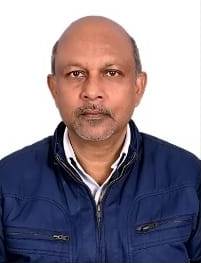About Department

Dr. Lokesh Varshney
Prof. & Head
Department of Mechanical Engineering
The Department of Mechanical Engineering at College of Technology, G. B. Pant University of Agriculture & Technology, Pantnagar offers Mechanical Engineering program at the Bachelor level since July 1966. Mechanical Engineering Department is one of the oldest departments and is considered to be highly renowned department of the College. The department is vibrant and it organizes several activities throughout the year. The strong and interactive curriculum and hands on learning has the capability of taking the students’ career to the next level - be in the professional engineering practice or in advanced study. The department, right from its inception, is focusing on quality teaching along with integrated laboratory experience. The department is also running Post Graduate Programs in Thermal Engineering and Design and Production Engineering since 1984. The department started its Ph.D. program in Mechanical Engineering in the year 1985. The Department feels proud of achievements of its alumni, who have excelled in various walks of life.
The department is one of the largest departments of the college consisting of dynamic, research oriented and well qualified faculty majority having Ph.D. degrees from IIT’s, NITs and other reputed institutions. The department has the most modern infrastructure to undertake effective teaching, research and developmental activities in its 23 numbers of laboratories which include Refrigeration and Air conditioning, Gas Dynamics, Heat Transfer, Internal Combustion Engine, Solar Energy, Biomass, Stress Analysis, Kinematics, Tribology, Material Science and Metallurgy along with a big central workshop comprising of facilities with modern machines. The department process highly sophisticated and imported equipment that include
In addition to above equipments, department has well developed Computer Aided Design Laboratory with latest Work Station, Servers, Computers and software like:
The department has a policy to periodically update the course curriculum in order to fulfill the present day need of the teaching learning process so as to accustom students with a perfect blend of intellectual and practical experiences that helps them to serve the society and address a variety of needs.
For Departmental Brochure Click Here
Vision:- To become a nationally recognized leader in technical education & research and capable of making significant contribution to the society in the field of Mechanical Engineering
Mission:-
PROGRAM OUTCOMES
- Engineering knowledge: Apply the knowledge of mathematics, science, engineeringfundamentals, and an engineering specialization to the solution of complex engineering problems.
- Problem analysis: Identify, formulate, review research literature, and analyze complexengineering problems reaching substantiated conclusions using first principles of mathematics, natural sciences, and engineering sciences.
- Design/development of solutions: Design solutions for complex engineering problems anddesign system components or processes that meet the specified needs with appropriate consideration for the public health and safety, and the cultural, societal, and environmental considerations.
- Conduct investigations of complex problems: Use research-based knowledge and researchmethods including design of experiments, analysis and interpretation of data, and synthesis of the information to provide valid conclusions.
- Modern tool usage: Create, select, and apply appropriate techniques, resources, and modernengineering and IT tools including prediction and modeling to complex engineering activities with an understanding of the limitations.
- The engineer and society: Apply reasoning informed by the contextual knowledge to assesssocietal, health, safety, legal and cultural issues and the consequent responsibilities relevant to the professional engineering practice.
- Environment and sustainability: Understand the impact of the professional engineering solutionsin societal and environmental contexts, and demonstrate the knowledge of, and need for sustainable development.
- Ethics: Apply ethical principles and commit to professional ethics and responsibilities and norms ofthe engineering practice.
- Individual and team work: Function effectively as an individual, and as a member or leader indiverse teams, and in multidisciplinary settings.
- Communication: Communicate effectively on complex engineering activities with the engineeringcommunity and with society at large, such as, being able to comprehend and write effective reports and design documentation, make effective presentations, and give and receive clear instructions.
- Project management and finance: Demonstrate knowledge and understanding of theengineering and management principles and apply these to one’s own work, as a member and leader in a team, to manage projects and in multidisciplinary environments.
- Life-long learning: Recognize the need for, and have the preparation and ability to engage inindependent and life-long learning in the broadest context of technological change.
Program Educational Objectives (PEOs)
PEO1: Produce engineers with strong fundamentals and adaptive skills to serve existing & evolving industries
PEO2: Conduct research focused on providing a technological edge to India in general and Uttarakhand in particular.
PEO3: Develop appropriate technologies for the prosperity of people in rural areas of India.
Consistency of PEOs with Mission of the Department
| PEO Statements | M1 | M2 |
|---|---|---|
| PEO1: Produce engineers with strong fundamentals and adaptive skills to serve existing & evolving industries | 3 | 3 |
| PEO2: Conduct research focused on providing a technological edge to India in general and Uttarakhand in particular | 2 | 3 |
| PEO3: Develop appropriate technologies for the prosperity of people in rural areas of India | 3 | 3 |
Program Specific Outcomes (PSOs)
- PSO1: Ability to acquire the latest knowledge of engineering principles and managerial skills to prepare themselves for emerging needs of the industry.
- PSO2: Ability to inculcate creative thinking to take up challenges in interdisciplinary areas and to provide real-life solutions.
- PSO3: Ability to analyze and design useful engineering systems for society.